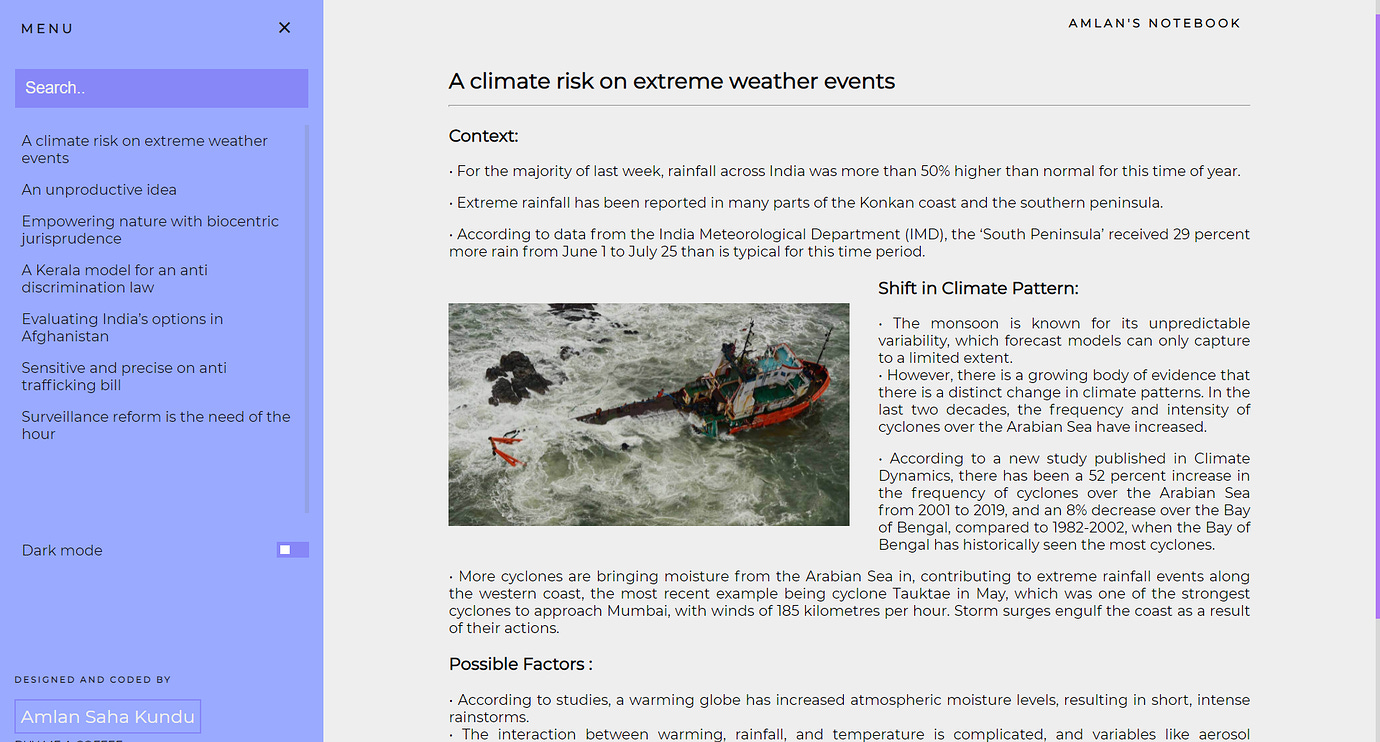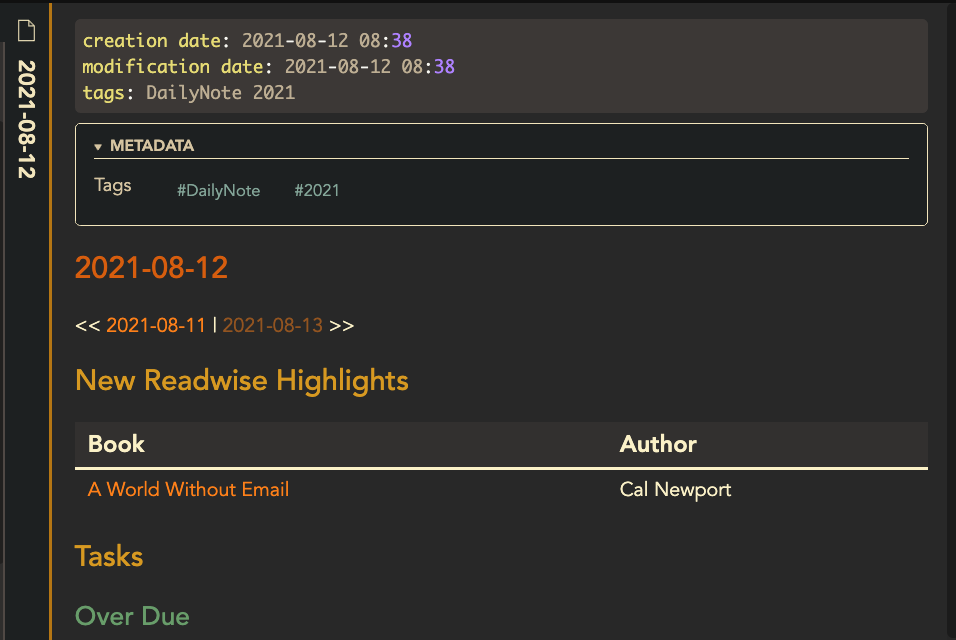From notes to tweet, articles, and videos
R.W. Roberson share's his system and a complete Roam walkthrough
Before we start, I took the LYT workshop in the last scholarship cohort. If you are interested in taking it and want to pay a bit less, send me a message. (No affiliate connection or perk for me, but I shouldn't widely spread this code).
Passage
"If any of you lacks wisdom, let him ask God, who gives generously to all without reproach, and it will be given him."
James 1:5
(Stolen from a reader: Regan Rose)
Talk
This week we're joined by R.W. Roberson whose videos I've shared in the past. I'm sure you'll enjoy his perspective too.
Could you introduce yourself to anyone who doesn't know you?
My name is R.W. Roberson. I’m a seminary student and college minister at my local church in Mississippi. I’ve also started dabbling in some online writing. Right now, I’m doing a deep dive into the difference between Protestant and Catholic understanding of authority, so you’ll see lots of writing pertaining to that on my blog.
What brought you to start taking connected bible notes?
I have one of those big [[Cambridge wide-margin Bibles]] that I use for everything. It’s a great Bible for taking notes for teaching, during sermons, and in my personal devotions. But more and more, I found myself circling the cross references already there. So between my marginal notes and cross-references, I decided I needed a place to really expand on some of my thoughts and connections. Before, I had a series of half-full notebooks with random thoughts, but as you can imagine, that’s not very effective. When I stumbled across [[Joschua’s video with Nick Milo]] I knew I’d found exactly what I needed. I downloaded a plain text Bible with his scripts and got started with it in Obsidian.
What brought you to use Obsidian for your notes? Did you use any others in the past
I got interested in the Zettelkasten method probably two years ago, but I could never quite get off the ground with it. It’s very intimidating to see all these people with huge libraries of connected notes, and I couldn’t quite figure out how everything worked. I downloaded several different programs to try out (including Obsidian). At the end of the day, they all sort of made my head spin, so I just decided to use Bear. [[Andy Matuschak]] uses it, and he seemed to be doing just fine. That worked for a while, but I was finding that Bear couldn’t quite produce the experience I was looking for. I briefly used Gomscope (a third-party companion to Bear with a graph view and backlinks), but eventually, I just decided I’d give Obsidian another try because it seemed like everyone was using it.
One of the great benefits of having spent several months with Bear was that I had a couple hundred notes to get started with in Obsidian. That made all the difference. Now, instead of staring at a blank screen, I actually had some notes I could link to. After that, I didn’t look back.
Do you use your notes app for other uses apart from bible notes?
Absolutely. I use Obsidian for basically all the research and writing I do. As a seminary student, it’s been invaluable in writing papers (and now my online writing). I do try to keep it to ideas though. For example, I use daily notes often, but they’re full of seedling ideas that I want to chase down. I don’t do any task management or planning in it (unless you count writing outlines). With that one caveat, anything and everything goes in my Obsidian vault. If I think I might use an idea, it always lands in Obsidian.
You are quite prolific in your publishing with a blog, twitter and YouTube videos; what is your motivation and how does your system help with that?
The system created the motivation.
When I first started with my notes, I had no intentions to use it beyond school and regular church teaching duties, but I quickly found that I had a lot more to say than I originally thought. And it turns out there are at least a handful of people interested in some of the same things.
My process is pretty simple. I begin by consuming something (usually books and articles) and putting key quotes and my personal notes in a literature note. Then I refine those and pull atomic ideas out into their own notes which get linked to other atomic notes. At this point, I’m at a dead-end on my own, so when I think I’ve exhausted an idea, I write up a blog post or a Tweet.
So, in a way, my notes force me to publish something. Otherwise, all these ideas would just rot on my harddrive and in my head. But if I put something out there, all these little seeds turn into something fruitful. That’s certainly helpful for me as it sharpens my thinking, but I’ve found it resonates with others as well. As I write, I feel like a little kid again, asking too many questions and stubbornly demanding answers (except today I don’t have to bother my parents).
What is one tip you'd give to someone new to taking linked notes?
I think it can be pretty uncomfortable to get started without any notes, but the only way to get over that discomfort is to just jump in. A good practical way to do that is to just take a book, article, or even a YouTube video and make a literature note with links to two or three atomic notes in it. If you do a handful of these literature notes, you’ll have a great seedbed of ideas to work with. The important thing is just getting over that initial hump.
How can people connect with you online?
The best way is Twitter (@rwroberson). I’m trying to post a short piece there every day for the month of August, and my DMs are always open.
You can also read my blog at [rwroberson.com](http://rwroberson.com/) or watch some of my [[YouTube videos]]. The blog has some of the same stuff you’ll find on Twitter, but more in depth. YouTube is mostly Obsidian and note-taking content.
Finally, if you're old school, my public email is rwrobers@gmail.com.
Links and Articles
I've had the ESV Digital Scripture Journal for a while (and even featured it in a past video) but I decided to take a closer look and how I use it with Obsidian.
Regan Rose again! This time showing how (and why) he uses Roam Research.
And now R.w. Roberson with a walk through making a literature note.
Pubsidian - An alternative to obsidian publish
Want to publish your Obsidian vault but don't want to use Obsidian's official service? This might be for you.
View your Readwise highlights in your daily notes
Want to look at your Readwise highlights in your daily note? Well, Ben has figured out a way!
Two posts on Imposter Syndrome
I came across J. David Stark's reflections inspired by Nijay Gupta's post on avoiding Imposter Syndrome at Biblical academic conferences. While I have never attended one of these conferences, the issues of imposter syndrome are common for many of us.
I love Nijay's practical tips and the supporting attitude David provides. I believe David's post in particular may be useful for any reader who struggles in this area.
Share your voice!
I've got a couple more interviews lined up but I'd love to invite you to take part too. If you are interested, fill in this quick form.






